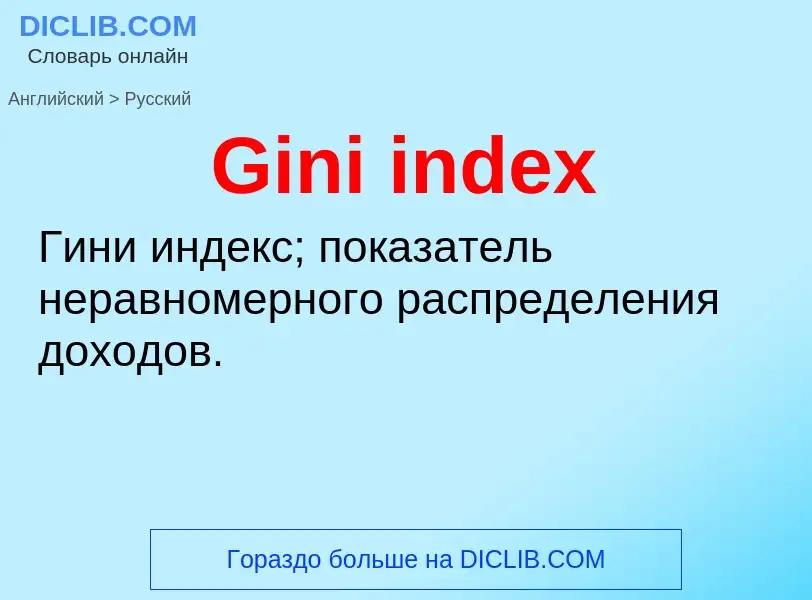Translation and analysis of words by ChatGPT artificial intelligence
On this page you can get a detailed analysis of a word or phrase, produced by the best artificial intelligence technology to date:
- how the word is used
- frequency of use
- it is used more often in oral or written speech
- word translation options
- usage examples (several phrases with translation)
- etymology
Gini index - translation to russian
['indeksiŋ]
общая лексика
индексация, индексирование
создание индексов
деление
индексация
индексирование
индексирующий
индицирование
нумерация
нумерование
существительное
техника
индексирование
деление окружности на части
периодическая круговая подача
программирование
индексирование (документов)
составление указателей
специальный термин
индицирование
приписывание индексов
Definition
Wikipedia
In economics, the Gini coefficient ( JEE-nee), also known as the Gini index or Gini ratio, is a measure of statistical dispersion intended to represent the income inequality or the wealth inequality or the consumption inequality within a nation or a social group. It was developed by statistician and sociologist Corrado Gini.
The Gini coefficient measures the inequality among values of a frequency distribution, such as levels of income. A Gini coefficient of 0 reflects perfect equality, where all income or wealth values are the same, while a Gini coefficient of 1 (or 100%) reflects maximal inequality among values. For example, if everyone has the same income, the Gini coefficient will be 0. In contrast, a Gini coefficient of 1 indicates that within a group of people, a single individual has all the income or consumption, while all others have none.
The Gini coefficient was proposed by Corrado Gini as a measure of inequality of income or wealth. For OECD countries, in the late 20th century, considering the effect of taxes and transfer payments, the income Gini coefficient ranged between 0.24 and 0.49, with Slovenia being the lowest and Mexico the highest. African countries had the highest pre-tax Gini coefficients in 2008–2009, with South Africa having the world's highest, estimated to be 0.63 to 0.7, although this figure drops to 0.52 after social assistance is taken into account, and drops again to 0.47 after taxation. The global income Gini coefficient in 2005 has been estimated to be between 0.61 and 0.68 by various sources.
There are some issues in interpreting a Gini coefficient as the same value may result from many different distribution curves. To mitigate this, the demographic structure should be taken into account. Countries with an aging population or with an increased birth rate experience an increasing pre-tax Gini coefficient even if real income distribution for working adults remains constant. Scholars have devised over a dozen variants of the Gini coefficient.

.png?width=200)

